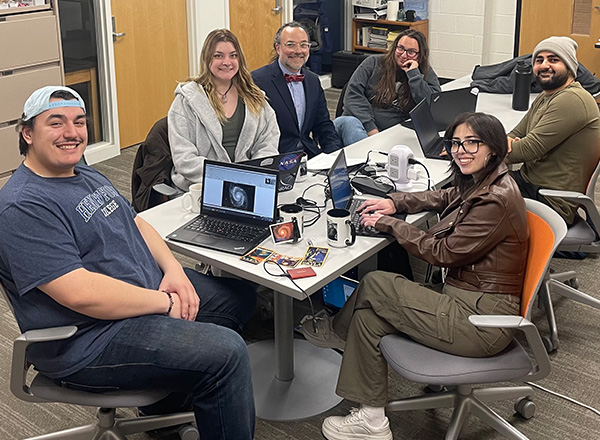Jesse Mason’s student research group awarded $20K grant, allowing them to work with international telescope data

HFC physics and astronomy instructor Jesse Mason’s student research group – alias the Dead Stars Society (DSS) – was recently awarded a $20,000 grant through the LSST Discovery Alliance. The funds will allow them to be one of the lead groups to work with data from a brand-new Chilean telescope, among other uses.
"This grant affirms the value our students have been contributing to the astrophysics community over the past year and will amplify the next phase of our research efforts,” said Mason. “I gave a presentation at a NASA AWESOM Cosmic Origins committee about our research and they asked how we’re able to do what we’re doing right now. I replied that I’m at the nexus of a dream team and our research group probably wouldn't exist without the generous support of my colleagues. I owe a big thanks to Dr. Hassan Mohseni Nameghi, Gillian John, Janice Gilliland, Brandon Laycock, Hans Harff, Jeremy Tabor, and Geoff Collins for their advice and assistance in making such an incredible educational opportunity possible for our students.”
“The LSST will explore our universe in unprecedented detail”
The $20,000 grant funding will be used to:
- Purchase four new laptop computers
- Complete four software workshops (open to all HFC students)
- Complete a professional development workshop
- Learn to work with the data obtained from the Legacy Survey of Space and Time (LSST) Telescope at the Vera C. Rubin Observatory in Chile
Mason pointed out that the LSST cost $700 million to construct and will go online in early 2025. At 3.2 gigapixels, the LSST will be the world’s biggest camera. (By contrast, your cell phone camera is about 12 to 16 megapixels. A gigapixel is 1 billion pixels.) Its main task will be to carry out a decade-long synoptic astronomical survey, photographing the entire southern sky every three days.
“The LSST will explore our universe in unprecedented detail,” said Mason. “For the next eight months, the DSS will complete 24 training modules, learning how the telescope works, how to process and interpret data from the telescope, and how to correlate that data with data from other telescopes. As part of the grant, our students will write a student-friendly guide for working with data from the LSST with the hopes of making similar astronomy research opportunities available to community college students all over the nation.”
Bringing graduate-level astrophysics research opportunities to students at a community college
Mason and the DSS are currently researching black holes (a type of dead star) in young star clusters residing in distant galaxies under the direction of renowned astrophysicist Dr. Kristen Dage, a NASA Einstein Fellow at Wayne State University. Dage, who has worked with the DSS since its founding, proposed the funding for the grant through the LSST Discovery Alliance, which was backed by the Heising-Simons Foundation.
“For a long while, Jesse and his students have been working with me to identify intermediate mass black holes in extragalactic star clusters,” said Dage. “They've managed to process and analyze 200 GB (or 150 individual observations) of X-ray data from the Chandra X-Ray Observatory in a very short time. They learned the data analysis and data processing methods that I learned in grad school. They've really blown me away with their dedication and enthusiasm for the project, they ask fantastic questions, and are just all-around fantastic. I am also just very excited that we can bring astrophysics research opportunities to students at this career stage.”
HFC will be one of the first groups to access the state-of-the-art telescope data
To say that HFC physics major Anthony Preston, a member of the DSS, is ecstatic about this grant would be an understatement. He called the grant “absolutely breathtaking.”
"I struggle to find the words to express how cool this situation actually is! We have absolute affirmation that this is meant to be and that it was meant to happen here at HFC!” he said. “Not only to be a part of it but especially to be the initial member of the research team and see how far it has come is incredible. All of the moments I have had and the memories I've made with people that I probably never would have interacted with are just small parts of the bigger picture.”
Preston continued: “Our team will be one of the first groups to access the state-of-the-art telescope data, which is absolutely bewildering to think about. That is not including the fact that they are paying to send someone to teach us how to manipulate that data because it is a completely different process from what we do currently. Never would I have suspected that this is what the DSS would amount to: Not only the scope of what we are doing but the viability of it as well. How many smaller institutions or community colleges are offering this sort of program to students? It is a legitimately life-changing experience and, hands down, one of the coolest things I've had the pleasure to be a part of in my life!”